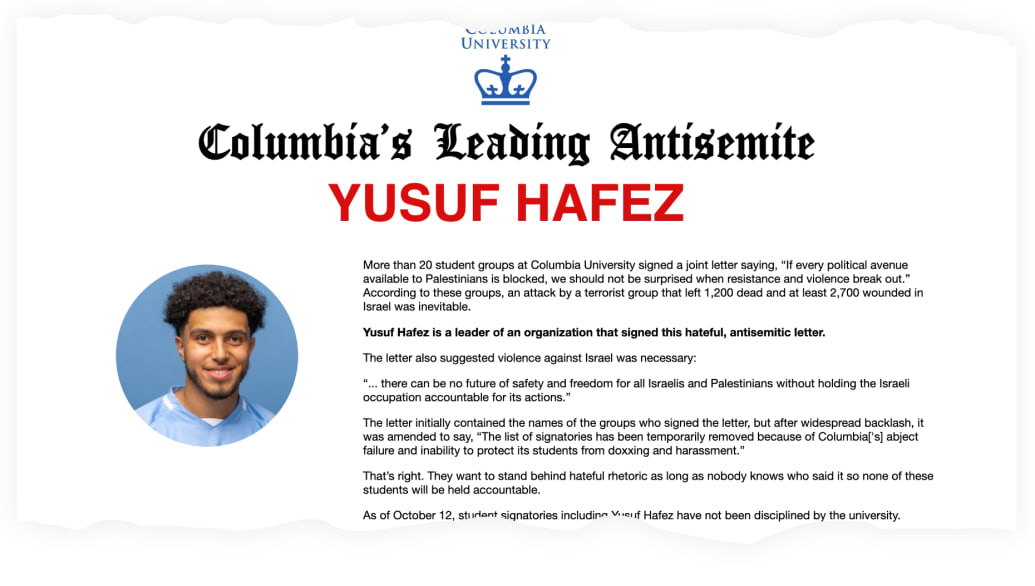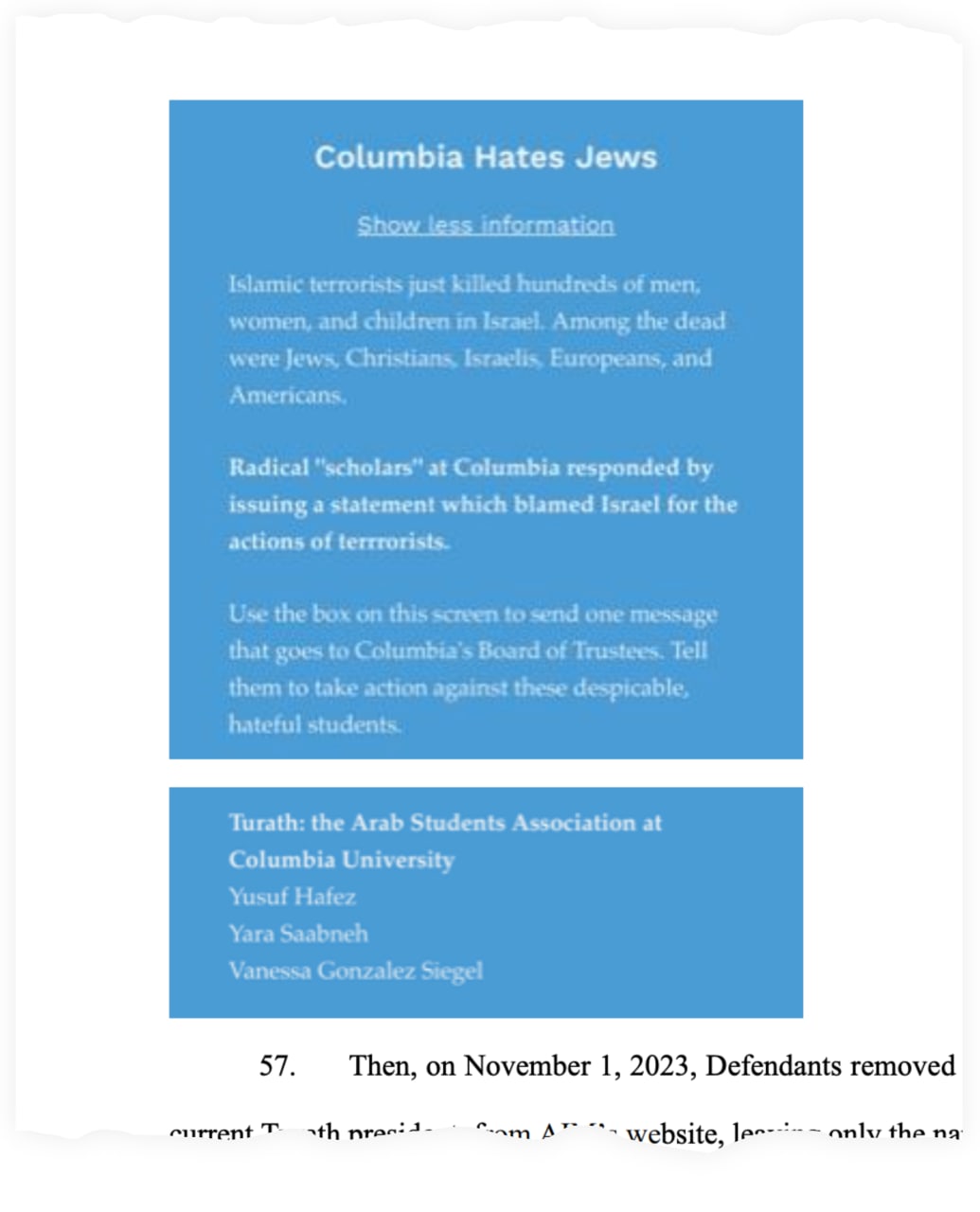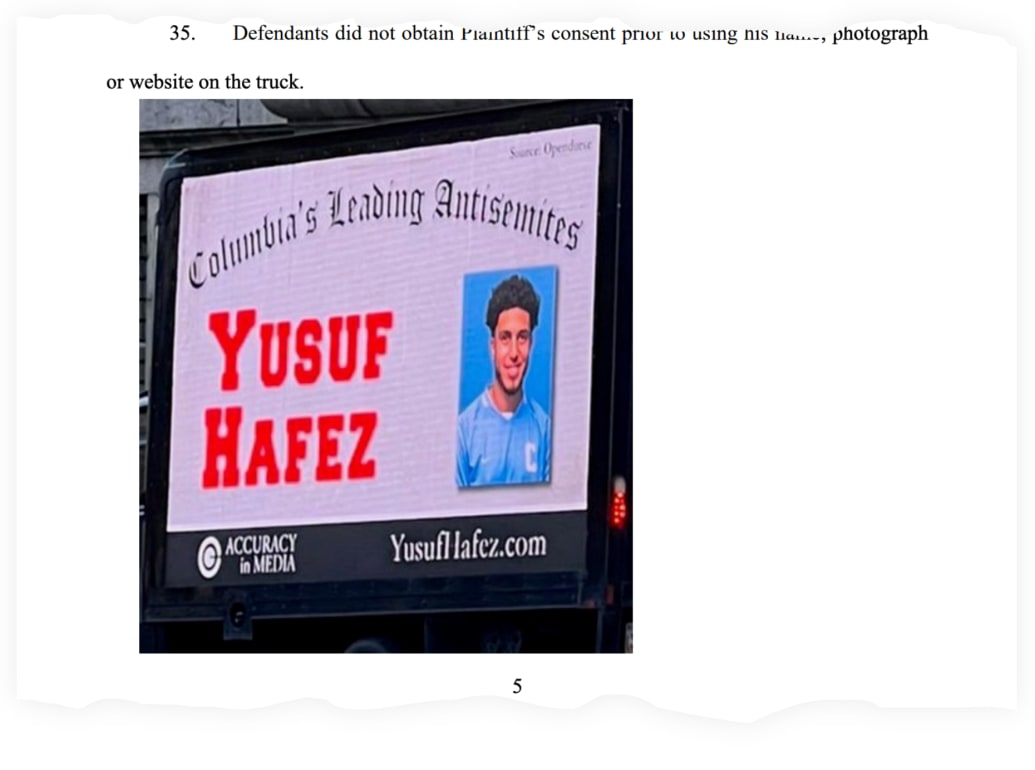A college student whose name and face were paraded through New York City streets last month on a truck-mounted mobile billboard describing him as one of “Columbia’s Leading Antisemites” is suing the organization behind the stunt for putting his “academic career and future employment prospects … at risk, as well as his safety.”
Yusuf Hafez, the former president of a campus Arab cultural group, says the conservative site Accuracy in Media (AIM) also called him out as “hateful” and “antisemitic” on a purpose-built website specifically “defaming and stigmatizing” Hafez for signing a letter he insists he never signed, according to a lawsuit obtained by The Daily Beast.
In it, Hafez claims being targeted by AIM has led to “shock, emotional and physical distress, and outright fear” for his life. He says he has since been unable to go back to school in person, has been unable to take any of his required exams, and claims “his grades have suffered and will continue to suffer from his displacement from the university community,” the lawsuit states.
The suit is among the first to be filed by the college students recently singled out by AIM.
Hafez’s attorneys, Jonathan Moore, Luna Droubi, and Deema Azizi, declined to comment on Monday, pending the filing of an emergency injunction on Tuesday to stop the AIM trucks from using their client’s likeness and to get the website about Hafez taken down. Inquiries sent to AIM’s communications office, as well as Adam Guillette, the president of AIM, went unanswered.
Yusuf Hafez’s likeness, seen on a truck circulating around Columbia University.
New York State Supreme Court
Hafez, an Egyptian-American senior in the Department of Civil Engineering and Engineering Mechanics, “always aspired to attend Columbia University,” according to the suit, which was filed Monday in New York State Supreme Court. He transferred to the Upper Manhattan school in Sept. 2021, joined the soccer team, and became active in various student associations, the suit states.
As a new student on campus, Hafez joined Turath, which describes itself as a nonpartisan undergraduate group celebrating Arab heritage, the lawsuit continues.
During his junior year, Hafez became Turath’s president for a nine-month stretch, before a new leader was elected in May 2023, according to the suit. In September, Hafez returned to Columbia to finish his final year of school.
On Oct. 25, at around 10 a.m., Hafez was in class when a friend alerted him that his image was plastered across a large digital billboard outside Columbia’s main entrance, according to the suit.
“The digital billboard displayed the words ‘Columbia’s Leading Antisemites’ and featured streaming photographs of a number of students including [Hafez],” as well as a URL, “yusufhafez.com,” the suit states.
The truck circulated through the area until roughly 5 p.m., then left, the suit goes on. It says the truck returned to Columbia on Nov. 1, again portraying Hafez as a Jew-hater. This time, Guillette “personally physically appeared at Columbia’s campus to continue his defamatory advertising campaign and, upon information and belief, to solicit donations,” according to the suit.
AIM’s outrage stemmed from an Oct. 11 letter disseminated on campus that expressed support for Palestine in the wake of Israeli retaliation for Hamas’ crossborder attack days earlier that killed more than 1,000 people. Some 12 days later, Guillette posted on X, formerly Twitter, that AIM had “purchased domain names corresponding to the names of several affiliates featured on its lists” of purported antisemites, Hafez among them, the lawsuit says.
“The yusefhafez.com website falsely claims that Plaintiff ‘Yusuf Hafez is a leader of an organization that signed this hateful, antisemitic letter,’” according to the suit. “The website falsely claims that [Hafez] was a ‘student signator[y]’ of the letter. Defendants did not obtain Plaintiff’s consent prior to using his name or photograph on the website.”

Yusuf Hafez says AIM’s truck and website have put his future job prospects in jeopardy and his safety at risk.
New York State Supreme Court
On its own website, AIM included Hafez—incorrectly, he claims—as the current president of Turath, a position he argues he left long ago.
“These are the names that Accuracy in Media was able to independently confirm as holding leadership roles within groups who signed the letter,” AIM wrote. (Hafez’s name has now been removed from the post, but was up as recently as Nov. 12.) “With one click, tell the Columbia Board of Trustees to take action against these despicable, hateful students.”
AIM and Guillette “continue to threaten the use of mobile billboard trucks ‘each week,’” according to the suit. “Significantly, just days ago on November 8, 2023, Defendants indicated that New Yorkers will ‘now [be] getting geotargeted ads’ featuring Columbia students, including [Hafez], ‘with the same message as the billboard.’”
AIM was founded in 1969 and purports to use “citizen activism and investigative journalism to expose media bias, corruption, and public policy failings.” The organization has published an article in 2006 downplaying the AIDS crisis; has seen its president minimize the fervor over the Jan. 6 attack at the Capitol as “ridiculous’ and “hypocritical”; and has seen a staffer derail former President Barack Obama’s decision to allow gay military leaders to serve as indicative of an “Orwellian Armed Forces.”
Aside from its conservative activism and its Project Veritas-style “investigations,” the group is also known for its Reed Irvine Accuracy in Media Award, named after its founder. Previous recipients of the award include the Gateway Pundit’s conspiratorial founder Jim Hoft and former Fox News host Tucker Carlson, who entertained false information on air during the 2020 election.
In a Halloween-night interview with Fox News, Guillette said, “[W]e only go after the leaders of these organizations, not the casual members. We don’t share any of their private information. We just take their names and photos.”
Its most recent “investigations” on its website include Guillette approaching pro-Palestinian protesters on college campuses, including Columbia and Harvard University.

AIM claims Columbia University “hates Jews.”
New York State Supreme Court
In Hafez’s case, the lawsuit says AIM identified him as the president of Turath “despite knowing that a new president had been elected effective May 2023.” Gullette “knew or should have known” that this was false since all of this information was publicly available when he and AIM purchased the domain in Hafez’s name, the suit states.
“Defendants’ statements were motivated by bias in seeking to accuse each and every student loosely associated with each student organization that signed the letter as antisemitic and hateful regardless of accuracy or truth,” it argues.
Hafez now lives in “constant fear” of aggressors moved to violence by AIM’s claims, and worries that he will be blacklisted by potential employers “as the public record is readily accessible” to anyone with an internet connection, the lawsuit says.
“Though he should be seeking employment after graduation, [Hafez] is unable to do so while the defamatory and false statements about him continue, including the continued existence of the unauthorized website using his name and likeness as well as the mobile billboard trucks,” it concludes, asking the court to restrain AIM from continuing to use Hafez’s likeness in its ongoing activities.
“Defendants and their agents have acted intentionally, in bad faith, with malice and with the specific intention to harm Plaintiff, Hafez’s lawsuit states, making one final point as clear as possible: “Plaintiff is not one of ‘Columbia’s Leading Antisemites.’”
He is suing for violation of civil rights, defamation, and intentional infliction of emotional distress, and is demanding compensatory and punitive damages in an amount to be determined at trial.










